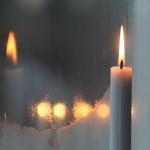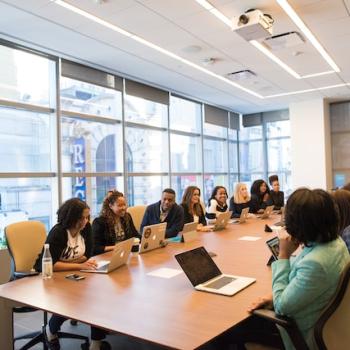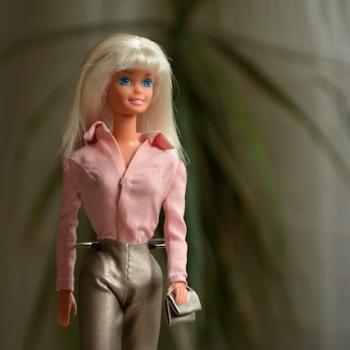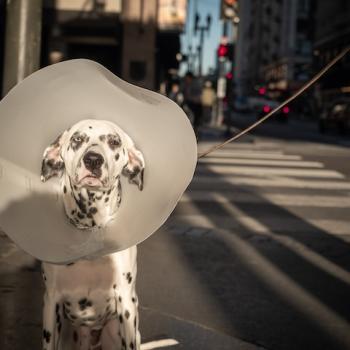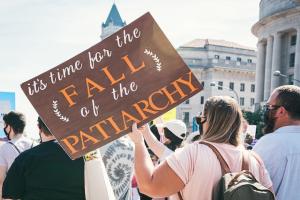
As the days get shorter again and kids prepare to go back to school, I wonder if this autumn will be my favorite season. What season is that? Well, the fall of the patriarchy, of course.
(Okay, but how comfy does this t-shirt look? I might need one.)
I don’t really expect the patriarchy to fall in the next few months. It’s not that easy. But I do appreciate that—between the Southern Baptist Convention’s shenanigans and the Barbie movie—it’s at least been getting some airtime this summer.
Which is good. Because if we’re going to dismantle it and find better ways to share power together, we need to be able to talk about it.
Finding Our Own Dreams
One of the things I think we have to talk about is this: What is life actually like for women who have decided to, well, live their own lives? Not just someone else’s expectations for them.
I was surprisingly moved, recently, by Matt Haig’s novel The Midnight Library. (Mild spoiler alert.)
The protagonist, Nora, is a woman who comes to realize that she has had many chances to live other people’s dreams for her. Those were the easy paths she could have taken in life. The harder path is to learn to dream for herself.
(That’s not the only thing—or even necessarily the main thing—that the book is about. But it’s definitely there.)
Finding and living our own dreams sounds nice. And I’m all for it. I also think, though, that a patriarchal society makes this difficult for women.
It’s not just difficult to find the courage to move in this direction. It’s also tangibly, literally difficult, once we’re doing it. Once we’re trying.
Looking Over Our Shoulders
I think of Sue Monk Kidd’s reflections on her spiritual journey as a woman in The Dance of the Dissident Daughter:
“My independent forays and outspokenness came at emotional cost and required excessive expenditures of energy. They engendered uneasy feelings, after-the-fact worry, second-guessing, and the habit of looking over my shoulder. Living without real inner authority, without access to my deep feminine strength, I carried around a fear of dissension, confrontation, backlash, a fear of not pleasing, not living up to sanctioned models of femininity” (19).
Sue Monk Kidd is a generation older than me. One might think that more has changed.
But I feel most of these things, too, when it comes to being my full self, dreaming my own dreams, living my own life: the excessive energy. The emotional cost. The unease. The worry. The fear of confrontation.
Really, it’s another way of saying what America Ferrera’s character said so resonantly in the Barbie movie.
But instead of saying “it’s literally impossible to be a woman,” Monk Kidd is saying something more like this: This is what happens when women do start to be more fully human. More fully ourselves. Exercising agency, refusing to cave to society’s impossible expectations of womanhood.
We find ourselves looking over our shoulders. And for good reason.
We aren’t paranoid. People really are watching. Judging. Ready to try to put us back in our place the second we step out of line.
This is our reality as women in a patriarchal world. And, in different ways, it’s the reality for everyone who finds themselves on the underside of different power structures: people of color, queer folks, disabled folks, people without financial resources.
As soon as we take steps toward our own liberation, we face backlash.
Breathing Fully
As I mentioned before, I enjoyed the Barbie movie, but there were also some things about it that gave me pause. One of those pause-giving things is where we find Barbie Land at the conclusion of the movie. (Larger spoilers here, I suppose.)
In the end, Barbie Land is still characterized by one gender exercising domination over the other. To be fair, the place seems infinitely better off when the Barbies are in charge than when the Kens are in charge. But I would rather see people of all genders learn how to share power together.
I think of biblical scholar Angela Parker’s analysis of women in church, from If God Still Breathes, Why Can’t I? She writes:
“Women often see themselves as second-class citizens. Yes, we may serve meals, take care of children, and teach women’s Bible studies, but all these duties are usually subsumed under the authority of male headship. Alchemy occurs when women begin to breathe in larger bursts of air instead of constantly holding their breaths because some man (Paul or Pastor) has not allowed full breathing” (18).
Full breathing. This is such a simple goal. Yet so profound.
The goal is not for women—or for others on the underside of various interlocking societal power structures—to gain power so that we can control and dominate like men do in a patriarchal system. (I’m drawing here on bell hooks’ Feminist Theory: From Margin to Center.)
What we want, instead, is simply to be able to breathe. Fully. “Larger bursts of air,” as Parker puts it. No longer “constantly holding [our] breaths”—or constantly looking over our shoulders.
We want to exercise a different kind of power: power to thrive, and to support the thriving of everyone in our community. Power to flourish, together. We want that alchemy.
We do not need to ask anyone’s permission for this. But it would be nice if we didn’t face such harsh backlash for going ahead and doing it. Going ahead and breathing. Making space for ourselves—and for everyone around us—to be fully human.
I don’t expect the fall of the patriarchy to suddenly, magically come to pass this autumn.
But maybe we’ll take a small step in that direction, as more and more women liberate ourselves. As we dream our own dreams, difficult as a patriarchal world may make it. As we access our inner authority and strength. As we breathe more fully.

